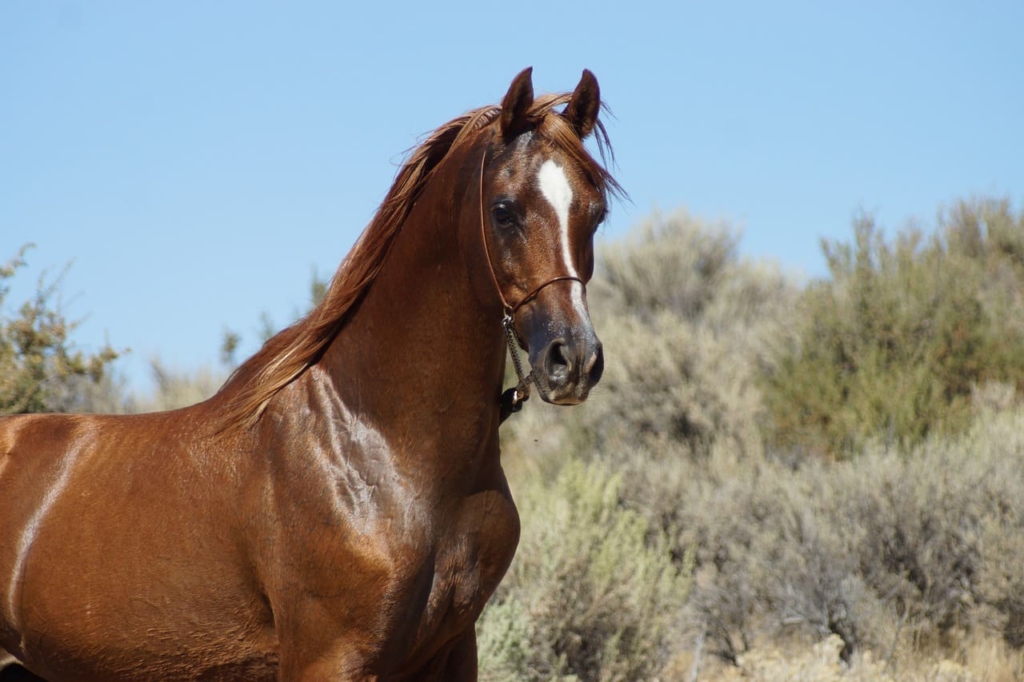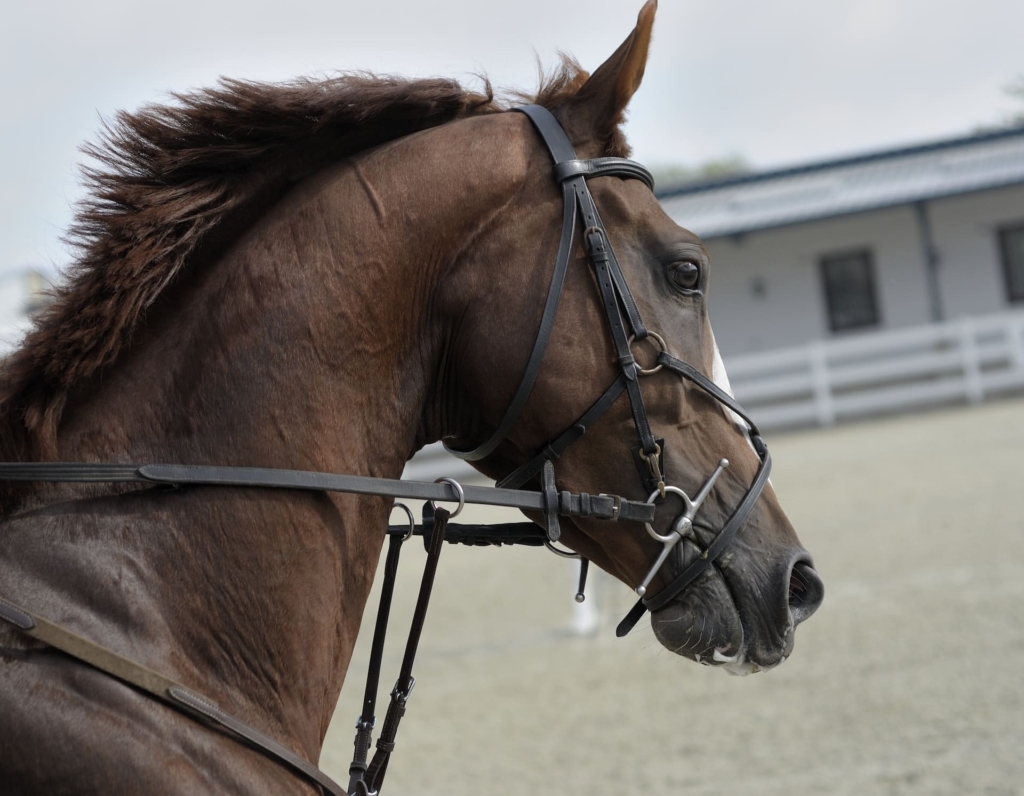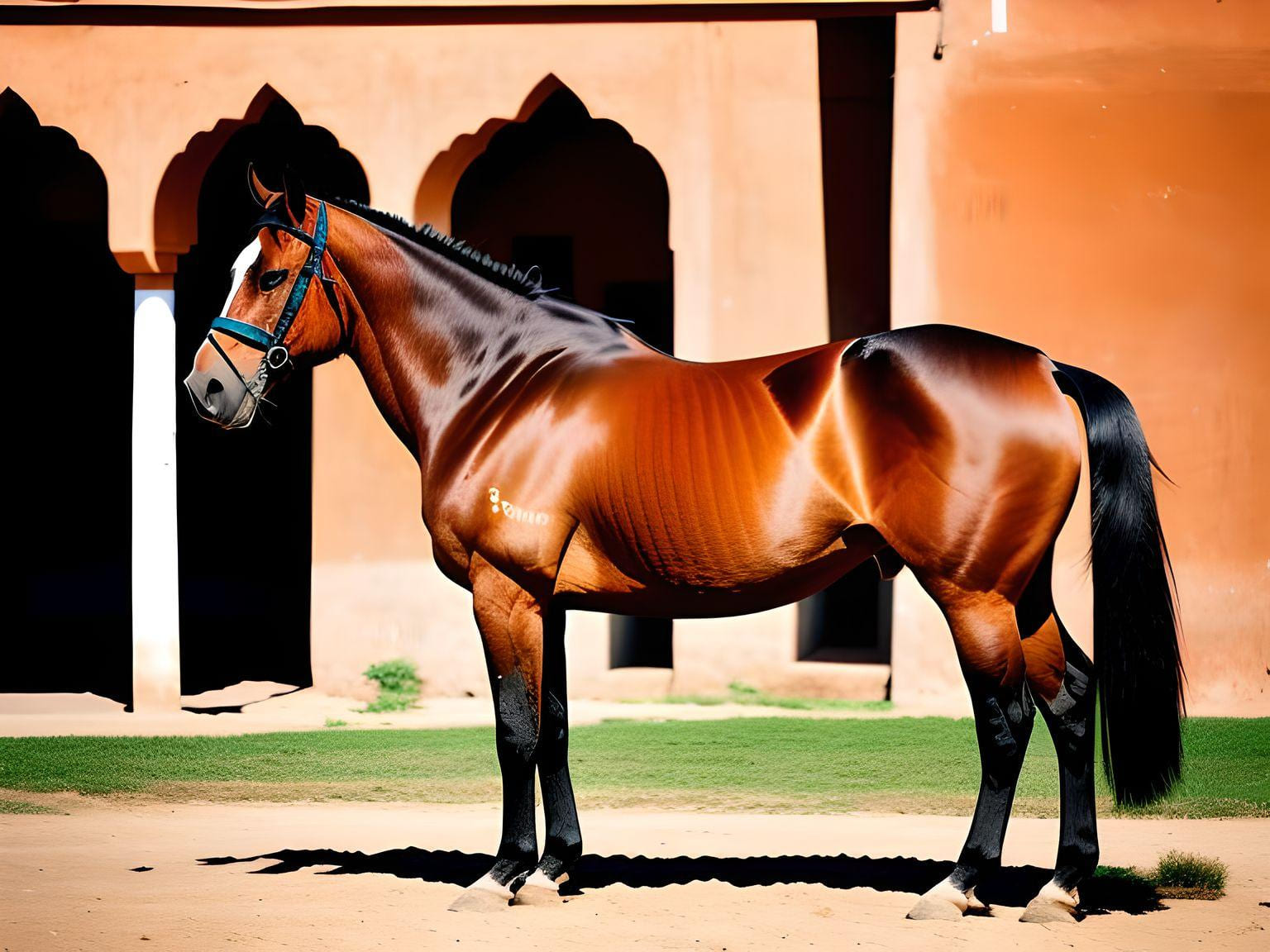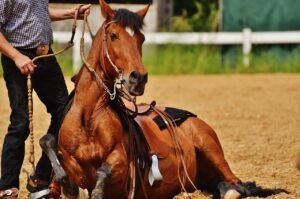Marwari Horse | Price, 6 Types, Breed Profile, Food, Care Tips, Health
Welcome to the fascinating world of Marwari horses! These magnificent creatures are a breed of horse that originates from the Marwar region of Rajasthan, India. Known for their distinctive appearance and remarkable abilities, Marwari-horses have captured the hearts of equestrian enthusiasts around the globe, explore everything you need to know about these Horse in this Article.
Marwari Horse
The Marwari horse is easily identified by its distinguishing trait, inward-turning ears. These majestic creatures’ ears, which are developed like a “V” or a crescent moon, give them an impression of elegance and grace. But the attraction does not end there. Marwari-horses stand out from other breeds due to their strong, muscular structure and royal demeanour.

Marwari-horses have exceptional endurance and agility in addition to their outstanding physical characteristics. They were historically bred as warhorses and were famous for their courage and devotion on the battlefield. They now excel in a variety of equestrian disciplines like as dressage, show jumping, and endurance riding.
Marwari horses also have a unique attractive gait known as the “revaal.” This unusual stride is distinguished by a four-beat lateral movement, which provides a bit of attraction to their already captivating demeanour. The grace and rhythm of these horse’s movements captivate both riders and spectators.
Marwari horses have increased in popularity in recent years, not only in India but across the world. Their remarkable beauty and adaptability have caught the interest of horse aficionados, breeders, and even collectors. As a result, attempts to maintain and safeguard the breed have been initiated, preserving its heritage for future generations.
Owning a these horse means embracing a rich cultural legacy as well as having a lovely equine companion. These horses are intimately associated with Rajasthan’s history and customs, where they were previously considered as a sign of are and the ruling class. Riding a Marwari-horse could take you back in time and link you with a bygone period of time.
Difference Between Nukra And Marwari Horse
Here are the key differences between the Nukra and Marwari horses:
| Features | Nukra Horse | Marwari-Horse |
|---|---|---|
| Origin | Northern India, particularly Punjab region | Marwar region of Rajasthan, India |
| Ears | Straight or slightly curved | Inward-turning ears (shaped like a “V” or crescent) |
| Physical Build | Strong, muscular build | Strong, muscular build |
| Gait | Generally smooth and steady | Distinctive “revaal” gait, four-beat lateral movement |
| Historical Usage | Historically used as a cavalry horse | Historically used as a warhorse and for hunting |
| Popularity | Less known and recognized globally | Increasing popularity worldwide |
| Cultural Significance | Less associated with specific cultural traditions | Deeply intertwined with the traditions of Rajasthan |
Marwari Horse Foal (Baby Marwari Horse)
The lovely world of Marwari horse foals, the delightful offspring of the majestic Marwari-horses, is introduced! These tiny Marwari-horses, often known as foals, are stunning. They capture everyone’s hearts with their innocent eyes, shaky legs, and lively disposition.

Marwari-horse foals are born with their parents’ characteristic inward-turning ears, which adds to their already attractive look. Their ears progressively expand into the classic “V” or crescent form that is linked with the Marwari breed as they mature.
Watching a Marwari-horse foal trotting around is a joyous experience. Their unsteady steps and playful antics are simply delightful to witness. These little bundles of energy can often be seen galloping and frolicking in the fields, honing their natural instincts and building their strength.
Types of Marwari Horse
Here are several types or variations of Marwari horses, such as Classic Marwari, Kathiawari Marwari, Malani Marwari, Jaisalmeri Marwari, Mewari Marwari, Shahpura Marwari:
Classic Marwari:

The Classic Marwari is the most common and well-known type of Marwari horse. It possesses all the distinctive characteristics of the breed, including the inward-turning ears, strong muscular build, and the elegant “revaal” gait.
Kathiawari Marwari:

The Kathiawari Marwari is a sub-type of the Marwari breed that originated in the Kathiawar region of Gujarat, India. It shares many similarities with the Classic Marwari but may have slight variations in appearance and temperament.
Malani Marwari:

The Malani Marwari horse hails from the Malani desert region of Rajasthan. It is known for its resilience, adaptability, and endurance, making it well-suited for arid and challenging terrains.
Jaisalmeri Marwari:

Named after the city of Jaisalmer in Rajasthan, the Jaisalmeri Marwari horse is highly valued for its regal presence and striking appearance. It often possesses strong traits that make it suitable for various equestrian disciplines.
Mewari Marwari:

The Mewari Marwari horse comes from the Mewar region of Rajasthan and is known for its elegance and grace. It is often sought after for its refined appearance and smooth, flowing movements.
Shahpura Marwari:

The Shahpura Marwari horse is closely associated with the equestrian traditions of the Shahpura royal family in Rajasthan. It is known for its majestic bearing and is often bred with an emphasis on preserving its royal lineage.
White Marwari Horse
The White Marwari-Horse is a stunning variation of the Marwari breed. With its pure white coat and the iconic inward-turning ears, it exudes an air of grace and elegance. The White Marwari is a sight to behold, often associated with beauty, purity, and enchantment.
Black Marwari Horse
The Black Marwari Horse is another captivating variation within the Marwari breed. With its sleek, glossy black coat and the distinct inward-turning ears, it embodies a sense of power and mystery. The Black Marwari is renowned for its striking presence and is often admired for its regal and majestic appearance.

History of Marwari Horse
The history of the Marwari-Horse is steeped in rich tradition and dates back several centuries. Originating from the Marwar region of Rajasthan, India, this magnificent breed has a storied past. These Horses were initially bred as warhorses, known for their loyalty, courage, and unwavering spirit on the battlefield. They were the trusted companions of Rajput warriors, who held them in high esteem.
The Marwari-Horse’s bloodline is believed to have traces of Arabian and Turkoman horse breeds, contributing to its distinctive features and exceptional abilities. Over time, the breed developed its iconic inward-turning ears, setting it apart from other horses. These Horses became a symbol of status and nobility, favoured by Rajput rulers and aristocracy.
Despite facing numerous challenges throughout history, including periods of decline and near-extinction, dedicated breeders and enthusiasts have worked tirelessly to preserve and revive the Marwari-Horse. Today, the breed’s popularity has grown worldwide, captivating the hearts of horse lovers, equestrians, and even collectors.
Appearance of Marwari Horse
The Marwari Horse is known for its breathtaking appearance. It possesses a unique combination of grace, strength, and elegance that sets it apart from other horse breeds. One of the most striking features of these Horse is its distinctive inward-turning ears, which can be shaped like a “V” or a crescent moon. These ears give the horse a regal and charismatic look.

In addition to their unique ears, These Horses have a strong, muscular build. They exhibit a well-proportioned body with a straight profile, expressive eyes, and a refined head. Their arched neck, sloping shoulders, and strong hindquarters contribute to their overall athletic appearance.
These Horses come in various coat colours, including bay, chestnut, grey, and black. Some may even display stunning patterns, such as dapples or roaning. Their glossy and lustrous coat further enhances their beauty, captivating onlookers wherever they go.
Temperament of Marwari Horse
The temperament of these Horse is as remarkable as its physical attributes. Known for their intelligence, loyalty, and courage, these Horses possess a spirited yet sensible nature. They are highly trainable and display a willingness to learn, making them versatile and adept in various equestrian disciplines.
The behaviour of Marwari Horse
The Marwari-Horse’s demeanour shows its ancestry and natural inclinations. These horses have kept the qualities that made them valued on the battlefield and in Rajasthan’s royal courts.

These Horses are known for their attentiveness and outstanding senses, which help them cross difficult terrain. They are extremely agile and frequently respond quickly to their environment. They are a treat to watch because of their innate elegance and beautiful movements.
Marwari Horse Price
In their country of origin, These Horses are highly valued and hold a special place in Indian culture and history. The price of Marwari Horses in India can vary depending on factors such as age, lineage, training, and overall quality. On average, the cost of a Marwari Horse in India ranges from INR 5,00,000 to 9,50,000, with exceptional specimens commanding higher prices.
Marwari Horse Price In India
The price of Marwari Horses in India can vary depending on factors such as age, lineage, training, and overall quality. On average, Marwari Horses in India are priced between ₹4,80,000 to 9,50,000. However, prices can vary significantly based on individual negotiations, specific bloodlines, and the reputation of the breeder or seller.
Marwari Horse Price in the United States:
Marwari Horses have gained popularity in the United States, and their availability has increased in recent years. The price of a Marwari-Horse in the US can vary depending on various factors such as age, training, bloodline, and overall quality. On average, Marwari Horses in the US can range from $10,000 to $50,000 or more. Exceptional individuals with superior bloodlines, show records, or unique attributes may command prices exceeding $50,000.
Marwari Horse Price in the United Kingdom:
The United Kingdom is home to a growing community of Marwari-Horse enthusiasts. The price of Marwari Horses in the UK can vary based on factors such as age, training, bloodline, and demand. On average, the cost of a Marwari Horse in the UK ranges from £8,000 to £30,000 or more.
Marwari Horse Baby Price
The price of these horse foals, also known as Marwari-horse babies, can vary depending on various factors such as lineage, bloodline, health, and potential. On average, Marwari horse babies can be priced from ₹2,00,000 to ₹5,00,000 or even higher, depending on their quality and pedigree.
Marwari Horse Prices In Major Indian Cities
Here are Marwari-Horse Prices In Major Indian Cities:
| Marwari-Horse Price List India | |
|---|---|
| Different Locations | Prices- |
| Marwari Horse Price in Delhi | ₹3,50,000 – ₹6,50,000 |
| Marwari Horse Price in Kolkata | ₹3,00,000 – ₹5,00,000 |
| Marwari Horse Price in Mumbai | ₹4,50,000 – ₹8,00,000 |
| Marwari Horse Price in Agra | ₹3,50,000 – ₹5,80,000 |
| Marwari Horse Price in Chennai | ₹3,00,000 – ₹5,50,000 |
| Marwari Horse Price in Pune | ₹3,80,000 – ₹6,20,000 |
| Marwari Horse Price in Bangalore | ₹3,50,000 – ₹6,00,000 |
| Marwari Horse Prices in Hyderabad | ₹3,50,000 – ₹6,00,000 |
| Marwari Horse Price in Chandigarh | ₹3,20,000 – ₹7,00,000 |
| Marwari Horse Price in Kerala | ₹4,00,000 – ₹7,10,000 |
| Marwari Horse Price in Jaipur | ₹5,00,000 – ₹9,50,000 |
| Marwari Horse Price in Indore | ₹4,00,000 – ₹7,00,000 |
| Marwari Horse Price In Ahmedabad | ₹3,50,000 – ₹6,50,000 |
| Marwari Horse Price In Lucknow | ₹3,80,000 – ₹7,00,000 |
| Marwari Horse Price In Nagpur | ₹4,00,000 – ₹7,10,000 |
| Marwari Horse Price In Coimbatore | ₹3,50,000 – ₹6,50,000 |
| Marwari Horse Price In Bhubaneswar | ₹3,00,000 – ₹6,80,000 |
| Marwari Horse Price In Punjab | ₹5,00,000 – ₹9,50,000 |
| Marwari Horse Price In Tamilnadu | ₹4,50,000 – ₹8,50,000 |
Factors that Affect the Price of Marwari Horse
Several factors influence the price of a Marwari-Horse. These include the horse’s age, lineage, training, overall quality, and even the reputation of the breeder or seller. Exceptional bloodlines, show records, and unique attributes can drive up the price. Additionally, factors such as demand, scarcity, and market trends can also impact the pricing of these Horses.
Monthly Maintenance Cost of Marwari Horse:
Owning a Marwari-Horse entails ongoing maintenance costs. These expenses typically include feed, bedding, veterinary care, farrier services, vaccinations, and routine health check-ups. The monthly maintenance cost can vary depending on factors such as the horse’s size, age, health, and individual requirements. It’s essential to consider these costs and budget accordingly to ensure the well-being of your Horse.

Availability of Marwari Horse in India:
Marwari-Horses, being native to India, are more readily available in their country of origin. Breeders and sellers specializing in Horses can be found in various regions across India, particularly in Rajasthan. However, their availability may vary based on factors such as demand, breeding programs, and individual circumstances. It’s advisable to connect with reputable breeders or equine associations to explore the availability of Horses.
Marwari Horse price comparison:
Marwari-Horse prices can vary depending on a number of factors, including location, quality, and individual negotiations. Before making a purchase, it’s a good idea to do some research and compare pricing from different breeders or retailers. This enables prospective buyers to acquire a better idea of current market values and make more educated judgements.
How to negotiate the price of Marwari Horse:
When negotiating the price of a Marwari-Horse, it’s essential to approach the process with knowledge and tact. Conduct thorough research on the horse’s value, considering factors such as age, training, and bloodline. Engage in open communication with the seller, expressing your interest and concerns. Negotiations can cover various aspects, including the purchase price, additional services, or future support. Remember to be respectful and considerate during the negotiation process.
The true cost of owning a Marwari Horse:
Owning a Marwari-Horse entails more than just the initial purchase price. It’s crucial to consider the ongoing costs associated with horse ownership, such as monthly maintenance, veterinary care, training, and equipment. Additional expenses can include boarding or stable fees, transportation, insurance, and participation in equestrian events. Understanding the true cost of owning a Horse allows prospective owners to plan their finances and ensure they can provide the necessary care and support for their horse.
Facts about Marwari Horses
Here are some interesting facts about Marwari-Horses:
- Unique Ears: These Horses are known for their distinctive inward-turning ears, which can be shaped like a “V” or a crescent moon. This characteristic sets them apart from other horse breeds.
- Indian Heritage: Marwari-Horses have a rich history and are native to the Marwar region of Rajasthan, India. They were once the trusted warhorses of Rajput warriors and held in high regard by royalty.
- Versatile Abilities: These horses are known for their versatility and excel in various equestrian disciplines. They are well-suited for activities such as dressage, show jumping, endurance riding, and pleasure riding.
- Graceful Appearance: Marwari-Horses have an elegant and regal appearance. They possess a well-proportioned body, expressive eyes, and a refined head. Their arched neck, sloping shoulders, and strong hindquarters contribute to their graceful movement.
- Endurance and Agility: Marwari-Horses exhibit remarkable endurance and agility, making them well-adapted to navigating challenging terrains. They are known for their ability to withstand long journeys and harsh environmental conditions.
- Intelligent and Loyal: Marwari-Horses are intelligent and quick learners. They form strong bonds with their human companions and are known for their loyalty and willingness to please.
- Cultural Symbol: Marwari-Horses hold cultural significance in India and are often associated with nobility and prestige. They are seen as a symbol of heritage and are cherished for their unique qualities.
- Increasing Popularity: Over the years, the popularity of these Horses has grown globally. They are now sought after by equestrians and horse enthusiasts around the world, who appreciate their beauty, versatility, and historical significance.
- Preservation Efforts: Dedicated breeders and organizations have worked tirelessly to preserve and revive the Horse breed. Their efforts have contributed to the continued existence and promotion of this remarkable horse breed.
- Symbol of Rajasthan: Marwari-Horses are considered an emblem of Rajasthan, representing the rich cultural heritage and traditions of the region. They are often seen in festivals, parades, and cultural events, adding a touch of grandeur and elegance.
Pros and Cons of Marwari Horses
Here are some major pros and cons of Marwari-Horses:
| Pros | Cons |
|---|---|
| Unique and distinctive appearance | Limited availability outside of India |
| Versatile and excel in various disciplines | Relatively smaller population |
| Endurance and agility | Specialized training may be required |
| Intelligent and quick learners | Higher initial purchase cost |
| Loyal and form strong bonds with humans | Specific care and maintenance required |
| Cultural and historical significance | Limited access to breed-specific shows |
| Adaptable to challenging terrains | May require experienced handlers |
| Growing popularity globally | Limited availability of bloodlines |
| Symbol of prestige and heritage | Specific saddle requirements |
Care Tips for Marwari Horse
Proper care is essential for maintaining the health and well-being of Marwari-Horses. Here are some care tips to keep in mind:
- Provide a balanced diet consisting of high-quality forage and appropriate concentrates.
- Ensure access to clean and fresh water at all times.
- Regularly groom the horse to promote healthy coat and skin.
- Schedule routine veterinary check-ups, vaccinations, and deworming.
- Maintain a clean and comfortable living environment, with adequate shelter.
- Provide regular exercise and mental stimulation to keep the horse physically and mentally fit.
- Handle the horse with patience, using positive reinforcement techniques.
- Regularly inspect hooves and schedule farrier visits for proper hoof care.
- Pay attention to dental health and schedule regular dental examinations.

Health Issues of Marwari Horse
While these Horses are generally healthy and hardy, they may be prone to certain health issues. Some common health issues include:
- Equine Infectious Anemia (EIA): This is a viral disease that affects the horse’s immune system.
- Colic: Marwari-Horses can be susceptible to colic, a condition that causes abdominal pain.
- Lameness: Issues such as joint problems or hoof-related conditions can lead to lameness.
- Skin Disorders: Some Horses may be prone to skin allergies or fungal infections.
- Eye Conditions: Certain eye conditions, such as squamous cell carcinoma, may be observed in these Horses.
Marwari Horse Lifespan
The average lifespan of a Marwari Horse ranges from 25 to 30 years, although with proper care, some individuals may live even longer. Factors such as genetics, overall health, diet, and management practices can influence the lifespan of a Horse.
Marwari Horse Height
Marwari-Horses are typically of medium height, ranging from 14 to 16 hands (56 to 64 inches) at the withers. However, individual horses can vary, and heights outside this range are possible.
Marwari Horse Size
Marwari-Horses are known for their elegant and refined appearance. They have a well-proportioned body with a graceful neck, sloping shoulders, and a strong hindquarters. While they are not considered a large breed, their size is appropriate for their versatility and agility.
Marwari Horse Weight
The weight of a Marwari-Horse can vary depending on factors such as height, build, and overall conditioning. On average, Marwari-Horses weigh between 900 to 1100 (420 kg – 450 kg) pounds. However, individual horses may weigh more or less based on their specific characteristics.
Food for Marwari Horse
Food for Marwari-Horse:
| Food Type | Description |
|---|---|
| Forage | Grass, hay, pasture, and forage cubes/pellets |
| Concentrates | Grains, such as oats, barley, corn, and commercial feeds |
| Supplements | Minerals, vitamins, and specialized supplements |
| Fresh Fruits | Apples, carrots, watermelon, and other horse-friendly fruits |
Names for Marwari -Horse
Names for Marwari-Horse:
| Name | Meaning/Significance |
|---|---|
| Veer | Brave or courageous |
| Nisha | Night or dark |
| Dhruv | Polestar or constant |
| Chetak | Legendary horse in Indian history |
| Rani | Queen or princess |
| Raju | Royal or princely |
| Kaliya | Serpent king from Hindu mythology |
| Anaya | Caring or compassionate |
| Amara | Immortal or eternal |
| Shakti | Strength or power |
Marwari-Horse Video
Video of Horse to let you understand Horse care tips, food, lifespan, and other factors. Video Credit: exploring Rajasthan
Conclusion:
The Marwari-Horse is a unique and versatile breed known for its distinctive appearance and rich cultural heritage. With their inward-turning ears, graceful movements, and loyal nature, These Horses have gained popularity worldwide. They excel in various equestrian disciplines and are adaptable to challenging terrains. Proper care and attention are essential for their health and well-being, allowing them to live up to 30 years or more. These Horse holds a symbolic significance, representing the regal heritage of Rajasthan. This breed continues to capture the hearts of horse enthusiasts with its grace, beauty, and historical significance.
Frequently Asked Questions:
-
What is a Marwari Horse?
Marwari -Horses are a unique breed known for their distinctive inward-turning ears and graceful appearance. They originated in the Marwar region of Rajasthan, India.
-
Where do Marwari Horses come from?
Marwari-Horses come from the Marwar region of Rajasthan, India. They have a rich history and were once the trusted warhorses of Rajput warriors.
-
What is the price of a Marwari Horse?
The price of a Marwari-Horse can vary based on factors such as age, training, bloodline, and individual characteristics. On average, Marwari Horses in India are priced between ₹4,80,000 to 9,50,000.
-
What is the lifespan of a Marwari Horse?
Marwari -Horses typically have a lifespan ranging from 25 to 30 years. With proper care and attention, they can live even longer.
-
What are the unique characteristics of Marwari Horses?
Marwari- Horses are known for their unique inward-turning ears, graceful movements, and regal appearance. They are versatile, intelligent, and have a loyal temperament.
-
Are Marwari Horses suitable for beginners?
Marwari -Horses can be suitable for beginners depending on their individual temperament and training. It is recommended for beginners to seek guidance from experienced trainers or instructors.
-
What disciplines are Marwari Horses best suited for?
Marwari- Horses are versatile and excel in various disciplines such as dressage, show jumping, endurance riding, and pleasure riding. Their agility and endurance make them well-suited for these activities.
-
How do I care for a Marwari Horse?
Proper care for a Marwari-Horse includes providing a balanced diet, regular grooming, veterinary check-ups, and a clean living environment. They require exercise, mental stimulation, and attention to their specific needs.
-
Are Marwari Horses rare?
Marwari-Horses are considered a rare breed outside of India. However, dedicated breeders and enthusiasts are working to preserve and promote the breed globally.
-
Can Marwari Horses be found outside of India?
Yes, Marwari-Horses can be found outside of India, although their availability may be limited. Breeding programs and import/export efforts have made them accessible in certain countries.
-
Are Marwari Horses good for endurance riding?
Yes, Marwari-Horses are well-suited for endurance riding due to their stamina, agility, and ability to navigate challenging terrains. Their natural resilience and adaptability make them excellent companions for long-distance rides.
-
Can Marwari Horses be trained for dressage?
Yes, Marwari -Horses can be trained for dressage. Their intelligence, willingness to learn, and elegant movements make them capable of excelling in this discipline with proper training and guidance.
-
Do Marwari Horses have any health issues?
While Marwari-Horses are generally healthy and hardy, they can be prone to common equine health issues such as colic, lameness, and skin disorders. Regular veterinary care, proper nutrition, and preventive measures can help mitigate these risks.
-
What is the temperament of a Marwari Horse?
Marwari-Horses are known for their loyal and affectionate temperament. They form strong bonds with their owners and are often willing to work and please. They are intelligent, alert, and adaptable.
-
Are Marwari-Horses good with children?
Marwari-Horses can be suitable for children, especially when properly trained and handled. Their gentle nature, combined with appropriate supervision and guidance, can make them excellent companions for children interested in horse riding and equestrian activities.
Recommended –
Indian Horse Race Tips (2023) | Mastering Indian Horse Race
Old German Shepherd Dog | Price, Breed Profile, Health, Care, Lifespan




























